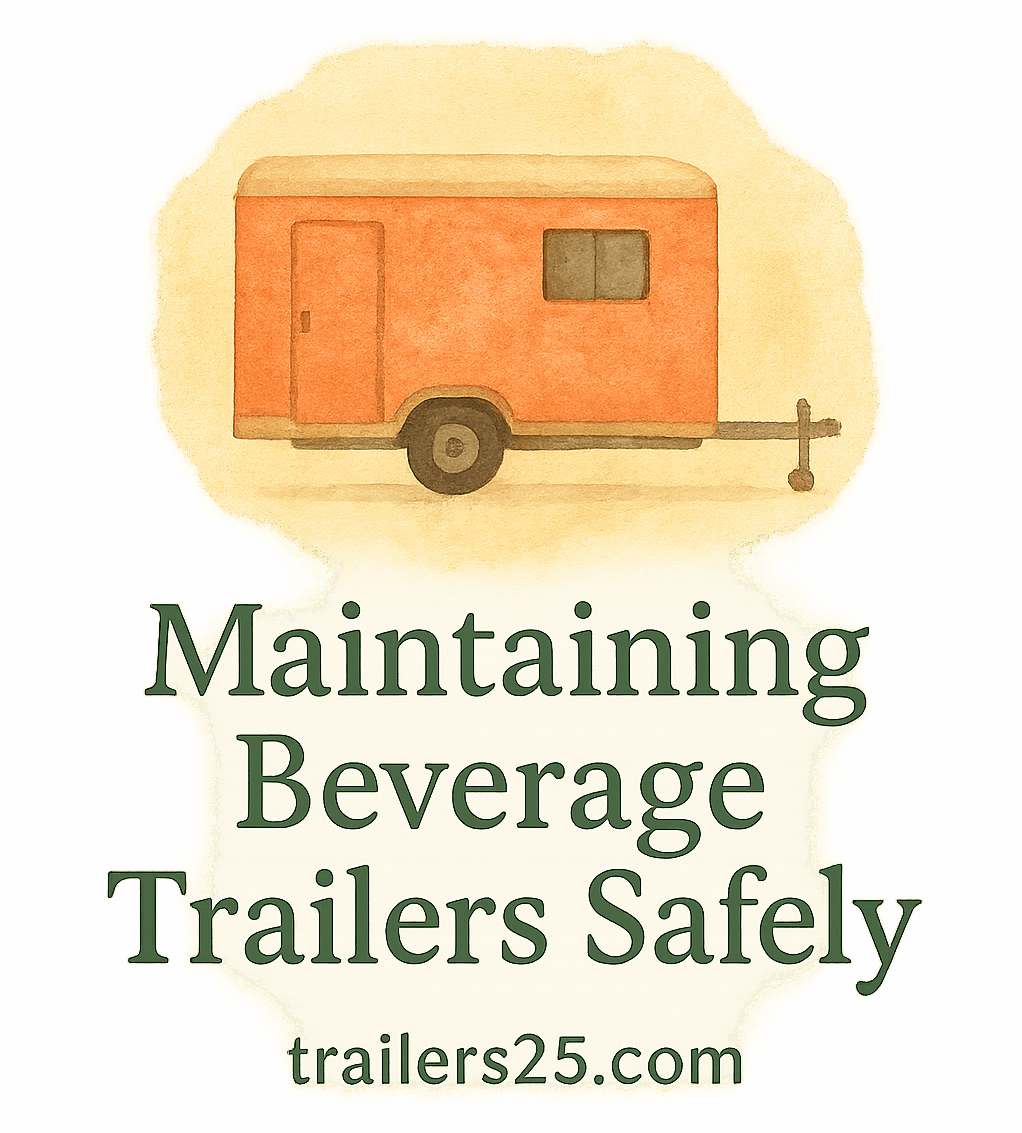Introduction
Running a beverage trailer is one of the most exciting ways to enter the food and drink industry. It gives you flexibility, mobility, and the chance to take your products straight to your customers. But as profitable as beverage trailers can be, they’re not immune to problems. From electrical hiccups to refrigeration breakdowns, these issues can slow down your operations if not addressed early.
The good news? Most of these problems have straightforward solutions. In this guide, we’ll cover 8 common issues with beverage trailers and their fixes, plus share preventive maintenance strategies to keep your mobile business running smoothly.
For even more insights, check out our buying guides and maintenance tips to stay ahead of trailer troubles.
Understanding Beverage Trailers
What Makes Beverage Trailers Unique
Unlike standard trailers, beverage trailers come equipped with specialized systems—plumbing, electrical wiring, refrigeration units, and serving stations. These extra features make them powerful business tools but also mean more maintenance responsibilities.
Learn more about essential add-ons in our guide on customization and upgrades.

Why Proper Care is Essential
Neglecting upkeep can do more than just hurt your wallet. It can lead to compliance violations, safety hazards, and lost customers. Regular care ensures smooth operations and extends your trailer’s lifespan. For advice, visit our section on safety and compliance.
Common Issues with Beverage Trailers
1. Electrical System Failures
Signs of Electrical Problems
Flickering lights, dead outlets, or appliances shutting down unexpectedly are early red flags.
How to Fix Electrical Issues
- Reset or replace circuit breakers.
- Inspect wiring for frays or corrosion.
- Replace faulty switches.
For major wiring issues, seek professional help—DIY can be risky. Explore more trailer tools and accessories that make troubleshooting easier.
2. Plumbing and Water Leaks
Common Causes of Leaks
Most leaks appear near sinks, tanks, or hoses. They’re often caused by worn seals or cracked pipes.
Effective Fixes
- Tighten connections.
- Replace damaged parts with food-grade alternatives.
- Use plumber’s tape for small leaks.
Check our maintenance guides for step-by-step instructions.
3. Refrigeration System Breakdowns
How to Spot Cooling Issues
Drinks not staying cold? Loud noises from the cooling unit? Those are telltale signs.
Fixes and Maintenance
- Clean condenser coils.
- Top up refrigerant.
- Replace faulty thermostats.
For detailed care, see our tips on essential equipment.
4. Tire Wear and Axle Problems
Why Tires Wear Quickly
Heavy loads, uneven roads, and poor axle alignment accelerate wear.
Fixes for Tires and Axles
- Rotate and balance regularly.
- Align axles to prevent uneven wear.
- Replace worn tires early.
Check our safe purchase tips to avoid buying low-quality tires.
5. Rust and Structural Corrosion
How Rust Impacts Trailers
Rust weakens frames, floors, and walls, compromising safety.
Best Fixes
- Wash and dry trailers often.
- Apply anti-rust coatings.
- Sand and repaint corroded areas quickly.
See our cost-saving maintenance strategies for budget-friendly rust prevention.
6. Trailer Hitch and Coupling Issues
Signs of Trouble
Wobbling trailers or loud clanking sounds often point to hitch problems.
Fixes
- Grease moving parts.
- Tighten bolts and connections.
- Replace cracked hitches immediately.
Learn more in our guide on trailer safety.
7. Interior Damage and Wear
Common Causes
Spills, high traffic, and constant use lead to worn floors, counters, and storage areas.
Repair and Prevention
- Install waterproof flooring.
- Use protective coatings.
- Replace broken parts before they escalate.
For inspiration, explore trailer modifications that enhance durability.
8. Compliance and Safety Failures
Why Compliance Matters
Ignoring local regulations can result in fines, shutdowns, and lost credibility.
Fixes
- Keep up with legal requirements.
- Install safety equipment like fire extinguishers.
- Schedule regular inspections.
Check our full guide on business compliance for detailed advice.
Preventive Maintenance for Beverage Trailers
Routine Inspection Checklist
- Check wiring and outlets.
- Inspect plumbing for leaks.
- Test brakes, tires, and axles.
- Evaluate refrigeration performance.
- Look for rust or cracks.
Cost-Saving Tips
- Fix minor problems early.
- Invest in high-quality parts.
- Keep a repair logbook.
Find more hacks in our affordable tips section.
When to Call a Professional
DIY Fixes vs. Expert Repairs
You can handle minor leaks or tire replacements yourself. But for electrical wiring or refrigeration breakdowns, hiring a professional saves time and prevents bigger costs.
How to Find the Right Service
Check certifications, reviews, and warranties before choosing. For more guidance, see our operations tips.
Conclusion
Beverage trailers are powerful business tools, but they require attention and care. From electrical issues to safety compliance, staying on top of common problems keeps your operations running smoothly. With regular maintenance, smart upgrades, and professional support when needed, you can extend your trailer’s life and maximize profits.
Stay ahead by following our business tips and never let small issues slow down your big goals.
FAQs
1. How often should I inspect my beverage trailer?
Every 6 months, or more frequently if you operate daily.
2. Can I repair plumbing leaks on my own?
Yes, small leaks are often DIY-friendly, but recurring issues need expert attention.
3. What’s the most expensive beverage trailer repair?
Refrigeration breakdowns are usually the costliest.
4. How do I prevent electrical issues?
Inspect wiring often and avoid overloading circuits.
5. Is rust repair worth the cost?
Absolutely—it extends your trailer’s lifespan and prevents structural failure.
6. Do I need special insurance for a beverage trailer?
Yes, commercial insurance plus liability coverage is essential.
7. What safety gear should every beverage trailer have?
Fire extinguishers, first aid kits, non-slip flooring, and proper signage.
